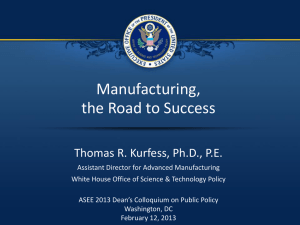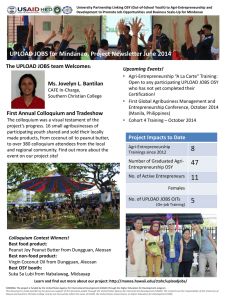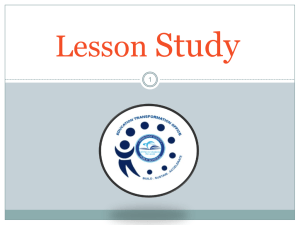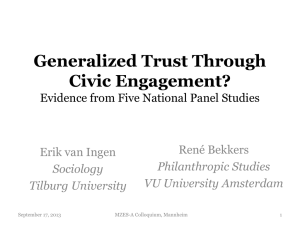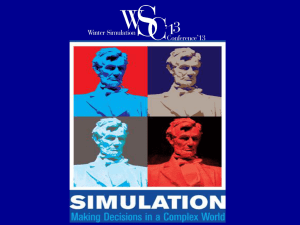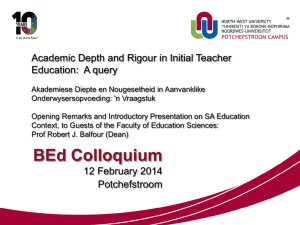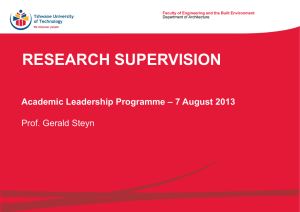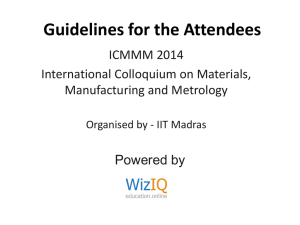Nkemleke-Teacher Education in Cameroon
advertisement
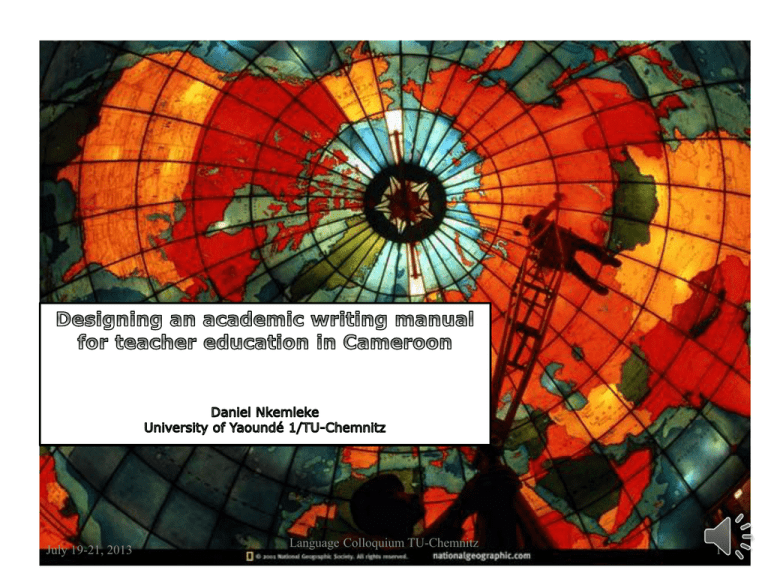
July 19-21, 2013 Language Colloquium TU-Chemnitz 1 Outline 1. Motivation 2. Goals 3. Theories 4. Modules 5. References July 19-21, 2013 Language Colloquium TU-Chemnitz 2 1. Motivation July 19-21, 2013 Language Colloquium TU-Chemnitz 3 July 19-21, 2013 Language Colloquium TU-Chemnitz 4 2. Goals 1: ability to write “successfully” in the following 4 contexts Finding admission into a university abroad Statements of purpose Personal statements Finding one’s voice in the academic community Communicating with other researchers Writing reviews Growing in the career and establishing a profile Grant applications Letters of recommendation Supporting the Publication Process Manuscript submissions Responding to reviewers and editors July 19-21, 2013 Language Colloquium TU-Chemnitz 5 2: ability to write “successfully” in the following 9 genres Books and monographs Research proposals Term papers Theses and dissertations Grant proposals Conference presentations Books and monographs Research articles July 19-21, 2013 Conference Presentations Abstracts Language Colloquium TU-Chemnitz Statements of intent 6 3. Theories of writing: a mosaic Contrastive rhetoric (writing across cultures), Kaplan 1966 July 19-21, 2013 Language Colloquium TU-Chemnitz 7 Contrastive Linguistics in the Classroom July 19-21, 2013 • Language is cultural experiences • L1 patterns transfer to L2 • Awareness of L1, L2 differences can improve language skills Language Colloquium TU-Chemnitz 8 The post-Kaplan era? From product to genre, end of journey? The Product Approach The Process Approach The Genre Approach ? Social constructivism „janus-face“?? New directions: corpus tools & web writing July 19-21, 2013 Language Colloquium TU-Chemnitz 9 Genre Communicative Events Communicative Purposes July 19-21, 2013 Discourse Communities Language Colloquium TU-Chemnitz 10 A generic example: the CARS Model (Swales 1990:141) Establishing a Territory Step 1: Claiming centrality (and/or) Step 2: Making topic generalization(s) (and/or) Step 3: Reviewing items of previous research Declining rhetorical effort Move Two: Establishing a niche Step 1A: Counter-claiming (or) Step 1B: Indicating a gap (or) Weakening knowledge claims Step 1C: Question-raising (or) Step 1D: Continuing a tradition Move Three: Occupying the niche Step 1A: Outlining purposes (or) Step 1B: Announcing present research Increasing explicitness Step 2: Announcing particular findings Step 3: Indicating RA structure July 19-21, 2013 Language Colloquium TU-Chemnitz 11 NEW DIRECTIONS: Corpus tools & Web writing July 19-21, 2013 Language Colloquium TU-Chemnitz 12 A corpus-based Approach : „Language focus“ vs. „genre focus“ July 19-21, 2013 Language Colloquium TU-Chemnitz 13 Reading helps writing? Eye-tracking on the web July 19-21, 2013 Language Colloquium TU-Chemnitz 14 July 19-21, 2013 Language Colloquium TU-Chemnitz 15 July 19-21, 2013 Language Colloquium TU-Chemnitz 16 July 19-21, 2013 Language Colloquium TU-Chemnitz 17 July 19-21, 2013 Language Colloquium TU-Chemnitz 18 Social constructivism: Writing is learning „how to mean“ (Halliday 1975) What does it all mean? July 19-21, 2013 Learning is a search for meaning. Learning must start with the issues around which students are actively trying to construct meaning. Language Colloquium TU-Chemnitz 19 How constructivism impact development of writing skills July 19-21, 2013 Language Colloquium TU-Chemnitz 20 Critical thining skills (Elder & Richard 2002) Categorization Decoding significance Clarifying meaning Interpretation Examining ideas Identifying arguments Analyzing arguments Analysis Assessing claims Assessing arguments Evaluation Querying evidence Conjecturing alternatives Drawing conclusions Inference Stating results Justifying procedures Presenting arguments Explanation Self-examination Self-correction Self-regulation July 19-21, 2013 Language Colloquium TU-Chemnitz 21 Application: A Synthesis of theories? (https://www.google.de/search?q=PPT%3B+Academic+writing, accessed.10.07.13) July 19-21, 2013 Language Colloquium TU-Chemnitz 22 4. Modules MOD1: MOD2: MOD3: MOD4: MOD5: July 19-21, 2013 The writing assignment process Writing effective sentences Academic writing style Critical thinking and writing Structure of academic registers Language Colloquium TU-Chemnitz 23 Duration of Project: 3 Years July 19-21, 2013 Language Colloquium TU-Chemnitz 24 THANK YOU FOR LISTENING! July 19-21, 2013 Language Colloquium TU-Chemnitz 25 5. References Elder, Linda and Richard Paul, R. University Library: Universal Intellectual Standards. Critical Thinking Consortium. Foundation for Critical Thinking. 28 May 2002 Faigley L (1986) Competing theories of process: a critique and a proposal. College English 48: 527-42. Ferris D (2003) Responding to writing. In B Kroll (ed.), Exploring the Dynamics of Second Language Writing. Cambridge: Cambridge University Press, pp.119-140. Ferris D & Hedgcock JS (1998) Teaching ESL Composition: Purpose, Process, and Practice. Mahwah: Lawrence Erlbaum. Flower L & Hayes JR (1981a) A cognitive process theory of writing. College Composition & Communication 32: 365-387. Flower L & Hayes JR (1981b) Plans that guide the composing process. In C.H. Frederiksen & J.F. Dominic (eds.), Writing: The Nature, Development, and Teaching of Written Communication Vol 2. Writing: Process, Development and Communication. Hillsdale: Lawrence Erlbaum, pp.39-58. Halliday, M.A.K. (1975). Learning How to Mean: Explorations in the Development of Language. London: Edward Arnold. Hyland K (2003) Genre-based pedagogies: a social response to process. Journal of Second Language Writing 12: 17-29. Ivanič R (2004) Discourses of writing and learning to write. Language & Education 18(3): 220-245 Kaplan, R. (1966). Cultural Thought Patterns in Intercultural Education. Language Learning 16(1):1-20. Richardson, W. (2006). Blogs, Wikis, Podcasts, and Other Powerful Web Tools for Classrooms . San Francisco, CA: Jossey-Bass. Susser, B. (1994) Process approaches in ESL/EFL writing instruction. Journal of Second Language Writing 3(1): 31-47. Swales, J. (1990). Genre Analysis: English in Academic and Research Settings. Cambridge: Cambridge University Press. White RV & Arndt V (1991) Process Writing. Harlow: Longman. Zeidner, M., Matthews, G., & Roberts, R. D. (2009). What we know about emotional intelligence: how it affects learning, work, relationships, and our mental health. Cambridge, Mass.: MIT Press. Zamel V (1983) The composing processes of advanced ESL students: six case studies. TESOL Quarterly 17: 165-187 July 19-21, 2013 Language Colloquium TU-Chemnitz 26
